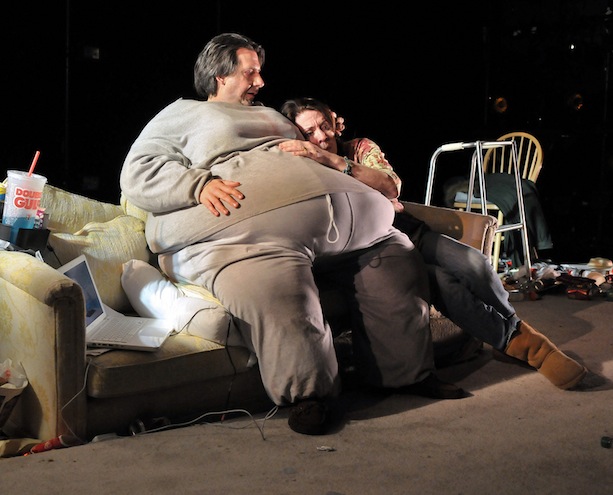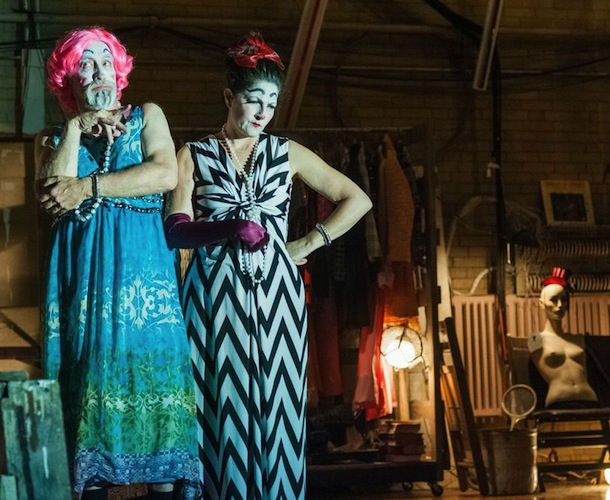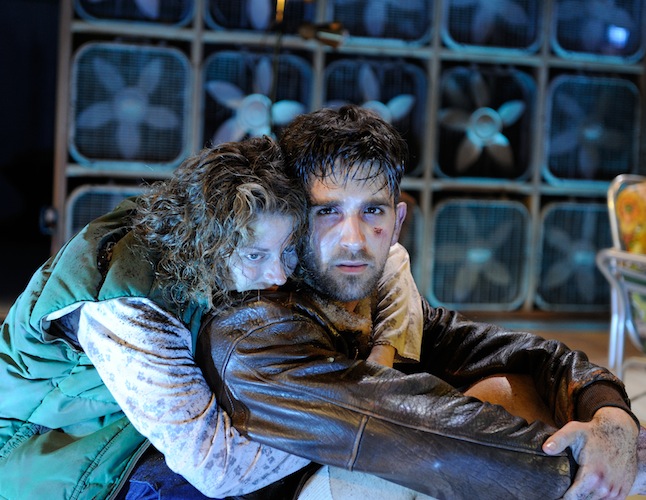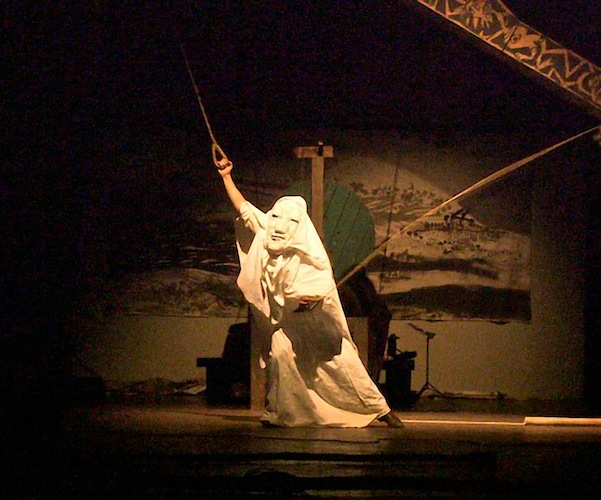Theater Feature: Best Stage Productions of 2014
Fuse theater critics pick some of the outstanding productions of the year.
By The Arts Fuse Staff
Arts Fuse stage critics have come up with some standout productions. Feel free to write in and tell us about your favorites — and why they were so good.
Bill Marx
Editor
The Arts Fuse
Live productions work best when the script, directing, acting, lighting, costumes, and stagecraft combine to create risky aesthetic conspiracies — the kind that wrench audiences out of their comfort zones and leave lasting impressions.
Here are my top choices for shows in 2014 that did just that:

John Kuntz and Maureen Keiller in the SpeakEasy Stage Company production of “The Whale.” Photo: Craig Bailey/Perspective
1) The Whale by Samuel D. Hunter. Directed by David R. Gammons, SpeakEasy Stage Company, Boston, MA. Hunter, 2014’s MacArthur Foundation “genius” grant recipient, set this play in his native Idaho where a morbidly obese gay man (actor John Kuntz wearing a “fat suit” designed by Gail Astrid Buckley) gorges himself to death after the loss of his lover. The production left audiences horrified but touched.
2) Into the Woods by Stephen Sondheim. Directed and staged by Spiro Veloudos, Lyric Stage Company, Boston, MA. A playfully spirited cast – including newcomer Maritza Bostic as a not-so-demure Little Red Ridinghood — riffed off each other with madcap glee, making this darkly dissonant musical re-telling of (fractured) fairy tales a rousing and joyous experience.
3) Fences by August Wilson. Directed by Eric C. Engel, Gloucester Stage Company, Gloucester, MA. Engel brought out surprising subtleties in the relationships among Wilson’s African American characters – notably cast members Daver Morrison and Jacqui Parker – who are struggling to maintain their dignity during the racial miasma of the ’50s (aftershocks of which reverberate today in places like Ferguson, Missouri).
4) In the Summer House by Jane Bowles. Directed by David Kaplan, Tennessee Williams Theatre Festival, Provincetown, MA. Kaplan reinvented Bowles’s fascinatingly idiosyncratic play: not only did he juxtapose parts of Act Two before Act One, but he made audience members follow a ragtag cast (headed by Irene Glezos) around the Boatslip Beach Club, moving from the outdoor deck to the dining, pool, and tented barroom areas. Somehow the production worked — it was a hallucinatory roller-coaster ride, and just as thrilling.
— Robert Israel
Robert Israel writes about theater, travel and the arts, and is a member of Independent Reviewers of New England (IRNE). He can be reached at risrael_97@yahoo.com
Best of 2014 in no particular order:
1.) The Real Thing. Bad Habit Productions presentation of this 1982 Tom Stoppard drama was not only skillfully acted and directed (by A. Nora Long), but its playful meditations on the combative interconnections among art, politics, commerce, theater, and television turned out to be an unintentionally prescient critique of trends in contemporary playwriting.
2.) and 3.) Director Guy Ben-Aharon’s interests as an importer of foreign plays began with Israeli Stage, and has grown to include German Stage and Austrian Stage. But as this year comes to an end, the plays I remember the most were both presentations of his Swiss Stage, a collaboration with SwissnexBoston, the Consulate of Switzerland. Cristina Castrillo’s Crack, hailing from the Italian-speaking part of Switzerland, is an absurdist comedy that focuses on love, and madness, and modernity. The stage reading featured inventive performances from Liz Hayes and Gabriel Kuttner. Meanwhile French-Swiss playwright Jérôme Richer‘s Barks is a haunting dystopian nightmare that resonates with Slobodan Milošević’s ’90s wars of ethnic cleansing in Bosnia and Kosovo and Vladimir Putin’s current expansionist efforts in Ukraine. The script also taps into a fear shared by many citizens of western democracies that the modern security state could be a prelude to a new authoritarianism.

Richard Snee (Luciana) and Sarah Newhouse (Adriana) in the Actors’ Shakespeare Project’s production of “The Comedy of Errors.” Photo: Stratton McCrady.
4.) David R. Gammons re-imagined Shakespeare’s early farce Comedy of Errors as a dress rehearsal by a down-on-its-luck circus troupe desperate for a hit. The idea might strike some as a too-neat auteurist conceit, but the entertaining production was always grounded in the text (something many directors forget when they take liberties with the Bard). The staging was also filled with delightful visual gags and physical comedy. It’s a pity that Actors’ Shakespeare Project is the only company that consistently gives Gammons plays that match his considerable directorial talents.
5.) Underground Railway Theater’s production of the Hans Krása and Adolf Hoffmeister children’s opera Brundibár, adapted by Tony Kushner. The piece was paired with Kushner’s one-act play But the Giraffe. The evening was an example that children’s theater can handle the big moral questions, including experiences of tyranny and genocide. Scott Edminston directed a gorgeous presentation of both plays. The opera, due to its history, has acquired immense power: originally composed as an act of resistance after the German annexation of the Czech Sudetenland, it was performed by children in the Theresienstadt concentration camp as a gesture of rebellion — their captors did not understand the libretto — shortly before Krása and most of the youthful cast were deported to Auschwitz for extermination. Kushner’s zesty curtain-opener proves that even when working in miniature he remains one of the most linguistically inventive dramatists around.
6.) Fort Point Theatre Channel’s production of Samuel Beckett’s Krapp’s Last Tape at the now defunct Factory Theatre featured a virtuoso collaboration between actor Steven Barkhimer and director Marc S. Miller, who managed to be respectfully inventive within the parameters of the dramatist’s notoriously precise stage directions.
7.) Tony Kushner’s The Intelligent Homosexual’s Guide to Captialism and Socialism With a Key to The Scriptures is the best, smartest, and most relevant new American play I have seen in my years of reviewing theater. I caught Theater J’s production, expertly directed by John Vreeke, while attending the Association for Jewish Theater conference in Washington, D.C.. Sadly, due to the lack of intellectual ambition and political correctness that permeates our most well-heeled theaters, and the shoe-string budgets of our most adventurous troupes, I doubt we will be seeing this play any time soon in the Boston area.
— Ian Thal
Unfortunately, maintaining the Arts Fuse and teaching full-time at Boston University slows down my theatergoing considerably. But I should mention a few productions that countered an increasingly homogenized theater scene.

Rebecca Gibel as Sally and Benjamin Grills as Jake in Sam Shepard’s “A Lie of the Mind,” at the Trinity Repertory Company. Photo: Mark Turek.
Critic Eric Bentley rightly valued audacious theater, and that is just what was on glorious display in Trinity Repertory Company’s nervy production of Sam Shepard’s A Lie of the Mind. Directed by Brian Mertes, the production had it all: terrific set, conceptual ambition, visual panache, haunting original music, and agile performances, all at the service of a surrealistic show-down of conflicting American realities.
Lydia R. Diamond’s Smart People was an amusing, at times moving, takedown of our “post-racial” world, and it received a snappy, well-acted production via Boston’s Huntington Theatre Company.
Both productions (The World Fixer and Knock! The Daniil Kharms Project) were hampered by the same directorial flaw: difficult material was made palatable for American audiences through irritatingly large doses of humor. But Austrian Stage and director Guy Ben-Aharon must be congratulated for tackling the powerful dramatist Thomas Bernhard, who is considered a major playwright in Europe. Alas, his dramas are rarely produced here: this staged reading was the American premiere of The World Fixer. And Imaginary Beasts should be saluted for bringing public attention to the brilliant, idiosyncratic-to–the-max-and-beyond work (dramatic sketches and prose) of Daniil Kharms, a Russian writer silenced by Stalin. Companies that take up provocative material in an increasingly mainstream-minded theater world should be encouraged.
Other worthy theatrical events: The splendid return of the Cambridge-based Poets’ Theatre — “reasserting its commitment to the enduring power of verse and performance” — with a superb staged reading of Dylan Thomas’s Under Milk Wood. (Note: Robert Scanlan, Artistic Director of Poets’ Theatre, writes for time to time for the Arts Fuse.)

A scene in Bread & Puppet’s “The Shatterer of Worlds” at the BCA’s Cyclorama. Photo: Mark Dannenhauer.
Bread & Puppet’s performance piece The Shatterer of Worlds, easily one of its darkest and most gauntly beautiful, took its cue from the dire words of pioneering nuclear scientist Robert Oppenheimer, who, after he saw the first atomic bomb explosion, quoted a passage from the Bhagavad Gita: “Life, the splendor of 1000 suns blazing all at once, resembling the exulted soul, is become Death, the shatterer of worlds.” Human obliteration — aided and abetted by opportunistic enablers — was the inspiration for this show, a stark excursion into the melancholic and downright disconcerting.
Bill Marx is the Editor-in-Chief of The Arts Fuse. For over three decades, he has written about arts and culture for print, broadcast, and online. He has regularly reviewed theater for National Public Radio Station WBUR and The Boston Globe. He created and edited WBUR Online Arts, a cultural webzine that in 2004 won an Online Journalism Award for Specialty Journalism. In 2007 he created The Arts Fuse, an online magazine dedicated to covering arts and culture in Boston and throughout New England.
Tagged: Bill-Marx, Brundibár, But The Giraffe!, Comedy of Errors, Fences, Ian Thal, In the Summer House, Into the Woods, Knock! The Daniil Kharms Project, Krapp's Last Tape, Poets' Theatre, Robert Israel, Smart People, The Intelligent Homosexual's Guide to Captialism and Socialism With a Key to The Scriptures, The Lie of the Mind, The Real Thing, The Whale, The World Fixer

Robert Israel and I have a shared admiration for David R. Gammons directoral work, but we differ greatly as to which of Gammons’ works deserve a place on a best-of-2014 list. In both The Comedy of Errors and The Whale (which I also reviewed), Gammons’ ability work with the thematic content of the plays, the actors, and designers to craft a visually and sonically rich show is well in evidence. However, when I suggested that not every company with which Gammons works “consistently gives [him] plays that match his considerable directorial talents”, The Whale was one of those plays I had in mind; most of the interest comes from the director and his ability to work with his chosen collaborators. The MacArthur Foundation, when it gives “genius” grants to jazz musicians and comic book creators (just to mention two other art forms I enjoy) they choose innovators and virtuosos with highly distinctive voices, but Samuel D. Hunter — at least if The Whale is representative of his work, is a pedestrian, unimaginative choice. Gammons is better than Hunter.
I’m not sure how The Lyric’s deepy moving and brilliantly acted production of Death of a Salesman failed to make it to any list, but Salesman would undoubtedly take my #2 slot, right behind the maddeningly successful and irresistible Finding Neverland, which I saw twice and will be a big hit on Broadway this spring.
Third for me would be the flawed but remarkable Becoming Cuba by Melinda Lopez that played at The Huntington Theatre Company earlier this year. Cinematic in it’s scope and storytelling, we don’t often see brand new plays THIS ambitious that are THIS good.
I thought The Whale was awful, mawkishly directed and smoothing out whatever was grotesque. I saw one great production which unfortunately nobody else saw at the Fuse: The Seagull from the good folks at the Wellfleet theatre.